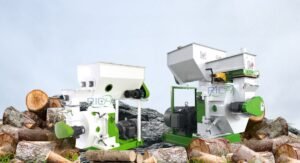
Wood pellet hammer mills are essential equipment in the biomass processing industry, playing a crucial role in the production of wood pellets and other biomass-derived products. These versatile machines are designed to reduce various types of biomass materials into fine particles suitable for pelletizing. This article explores the primary application scenarios of wood pellet hammer mills, highlighting their importance in different sectors.
- Wood Pellet Production
The most common and significant application of wood pellet hammer mills is in the wood pellet production industry. In this scenario, the hammer mill serves as a critical component in the pellet production line, processing raw wood materials such as:
- Sawdust
- Wood chips
- Tree branches
- Forestry residues
The hammer mill grinds these materials into a consistent, fine particle size (typically 3-5 mm) suitable for pelletizing. This process is crucial for producing high-quality wood pellets used in residential heating, industrial boilers, and power generation. For instance, the CF500B wood hammer mill offered by Biopellet Machine can process wood materials with a capacity of 800-1100 kg/h, making it ideal for industrial-scale wood pellet production.
- Agricultural Biomass Processing
Beyond wood materials, hammer mills are extensively used in processing agricultural biomass for pellet production and other applications. Key materials include:
- Straw (wheat, rice, corn)
- Corn stalks
- Cotton stalks
- Other crop residues
The versatility of machines like the electric wood hammer mill from Biopellet Machine allows for processing various agricultural materials, expanding the range of raw materials that can be used in biomass pellet production. This application is particularly important in regions with abundant agricultural residues, providing a means to convert waste into valuable energy resources. (Related post:wood chipper for sale)
- Biofuel Production
Wood pellet hammer mills play a significant role in the broader biofuel industry. They are used to process biomass for various biofuel applications, including:
- Bioethanol production
- Biogas production
- Other bioenergy applications
By reducing biomass to a consistent particle size, hammer mills facilitate more efficient conversion of biomass into liquid or gaseous biofuels. This application is crucial for the renewable energy sector, contributing to the reduction of fossil fuel dependence.
- Animal Feed Production
While primarily associated with biomass energy, wood pellet hammer mills are also utilized in the animal feed industry. They are used for grinding ingredients used in animal feed production, such as:
- Grains
- Hay
- Other feed ingredients
The ability to produce a uniform particle size is crucial for creating high-quality animal feed, ensuring proper nutrient absorption and digestibility. This versatility makes hammer mills valuable equipment in agricultural settings beyond just biomass processing.
- Waste Management and Recycling
Wood pellet hammer mills serve an important function in waste management and recycling operations, particularly in processing:
- Urban wood waste
- Construction and demolition wood debris
- Landscaping waste
By reducing these waste materials to a usable form, hammer mills contribute to sustainable waste management practices, turning potential landfill material into valuable biomass feedstock.
- Composting and Soil Amendment
In the composting and soil amendment sector, hammer mills are used to process organic materials for:
- Creating compost mixtures
- Producing soil amendments
- Processing garden waste
The fine particles produced by hammer mills decompose more quickly, accelerating the composting process and creating higher-quality soil amendments.
- Pulp and Paper Industry
The pulp and paper industry utilizes wood pellet hammer mills for:
- Processing wood chips for pulp production
- Recycling paper products
- Preparing biomass for co-firing in paper mills
This application helps in optimizing raw material usage and supports sustainable practices in the paper industry.
- Biomass Co-firing in Power Plants
Many power plants are adopting biomass co-firing to reduce their carbon footprint. Wood pellet hammer mills are crucial in this scenario for:
- Preparing biomass for co-firing with coal
- Processing diverse biomass sources to meet power plant specifications
This application is significant in the transition towards cleaner energy production in existing power infrastructure.
Conclusion
Wood pellet hammer mills demonstrate remarkable versatility across various industries and applications. From their primary role in wood pellet production to diverse applications in agriculture, biofuel production, waste management, and beyond, these machines are integral to the efficient utilization of biomass resources.
The adaptability of wood pellet hammer mills to process different materials and their ability to produce consistent particle sizes make them indispensable in the growing biomass and renewable energy sectors.
As industries continue to seek sustainable practices and alternative energy sources, the importance and application scope of wood pellet hammer mills are likely to expand further.For businesses involved in biomass processing or considering entering this field, understanding the diverse applications of wood pellet hammer mills is crucial. It not only highlights the versatility of the equipment but also opens up potential avenues for diversification and value addition in biomass-related industries.
For details please contact: wood pellet maker
WhatsApp:86 138 3838 9622
Email:enquiry@richipelletmachine.com






